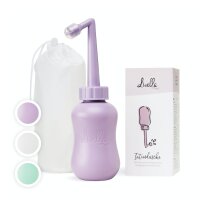One day breastfeeding is going super well, and the next day your baby is refusing the breast. Every time you try to put your little one to the breast, your attempt to breastfeed ends in restlessness, fidgeting and crying.
A breastfeeding strike is a very stressful experience for mothers. Especially if it happens before the baby is old enough to compensate for the missed feeds with solid foods. Very quickly the fear settles in that the little one might not get the nutrients he or she needs for healthy development.
What to do if your baby refuses to breastfeed? How long do breastfeeding strikes last? What are the most common causes for nursing strikes? What are typical signs that a baby is refusing the breast?
Table of contents
Signs that your baby is refusing the breast
What causes can lead to a breastfeeding strike?
My baby is refusing the breast: what can I do?
Getting professional help to overcome a breastfeeding strike
A final word on breastfeeding strikes
Signs that your baby is refusing the breast
Breastfeeding strikes can occur at any point during your breastfeeding journey. This means that your baby might start to refuse your breast not only immediately after birth but even after weeks or months of successful breastfeeding.
Regardless of when the breast refusal starts, the behavioural patterns in your baby are always the same. Typical behaviours during a breastfeeding strike include:
- Restlessness at the breast
- Turning of the head
- Pushing away from the breast with the hands
- Arching of the back in protest
- Screaming and crying
- Only very brief sucking at the breast
- Dissatisfaction and frustration
Many breastfeeding mums are worried by their baby’s behaviour and ask themselves: How long does breast refusal last? There is no definite answer to this question, since the duration of breastfeeding strikes can vary and largely depends on why the baby is refusing the breast. The sooner you can identify the root cause of the nursing strike, the sooner it will be over.

What causes can lead to a breastfeeding strike?
There can be many different reasons why babies are refusing the breast. The individual cause can vary depending on your baby’s age and stage of development.
The most common causes include:
- Long and complicated birth: Nursing strikes that happen directly after birth are often caused by complications during labour. After a long and difficult birth, your baby may simply be too exhausted to show much interest in breastfeeding.
- Changed taste of your breast milk: Your breastfeeding diet can have an impact on the taste of your breast milk. If your milk suddenly tastes different, your baby may temporarily refuse to feed. Drinking alcohol and breastfeeding or breastfeeding while taking medications can also affect the flavour of your milk.
- Changes in your body odour: Your baby is used to the way you smell. If you change your deodorant, soap or anything else that changes your body scents, your baby will notice and might refuse to breastfeed.
- Pain or illness in your baby: Breast refusal can also be due to your baby being in pain. It’s not uncommon for babies to start rejecting their mother’s breast when they experience pain because the desire to breastfeed is then simply eclipsed by the feeling of pain. The same goes for sick babies. For instance, babies who suffer from breastfeeding thrush are often reluctant to breastfeed.
- Your own stress levels: Stress or general feelings of tension can not only inhibit your let-down reflex, but they can also be picked up by your baby and lead to breast refusal.
- Unsuitable breastfeeding position: Every mother-infant pair has their own favourite breastfeeding positions. But just because a particular breastfeeding hold has worked well in the beginning, it doesn't mean that it will stay that way. As your baby grows, some breastfeeding positions may simply become uncomfortable, which can trigger a breastfeeding strike.
- Overactive let-down reflex: An overactive let-down reflex is often too much to handle for your baby. If your milk literally shoots out of your breast every time your baby latches on, he or she may not only respond with gagging, crying and coughing, but also start refusing the breast.
- Breast milk oversupply: Breast milk oversupply can also lead to your baby becoming frustrated with breastfeeding. If the milk flow is too strong, drinking at the breast can become very uncomfortable for your newborn who might therefore decide to go on a nursing strike.
- Low breast milk supply: Low milk supply can also be the reason why your baby is refusing the breast. If there is only little milk coming out of your breast, this will become very frustrating for your baby in the long run.
- Nipple confusion: Temporarily feeding your baby with the bottle often leads to your baby adopting a different sucking technique that is suitable for drinking from a bottle but not from your breast. This is known as nipple confusion and can also cause a breastfeeding strike.
- Teething: Many babies are in pain when their first teeth arrive, which might lead to breast refusal until the pain is gone.
- Growth spurts: Growth spurts take up a lot of your baby’s energy. Given all the changes that are going on in an infant’s body, it’s not uncommon for babies to be exhausted and refuse the breast during periods of growth.
- Distractions: Once babies get to a certain age, they are easily distracted by what is happening around them. If there are too many distractions in their immediate surroundings, babies often refuse the breast because they are simply more interested in everything that is not their mother’s breast. Depending on your baby’s age, breast refusal might also be a sign that it’s time to stop breastfeeding.
My baby is refusing the breast: what can I do?
There are almost as many techniques to overcome a breastfeeding strike as there are things that can lead to your baby refusing the breast. Here are a few tips on how to get your baby to breastfeed again:
- Take your time and be patient: If your baby doesn’t want to breastfeed, it’s important to stay calm and show patience. Getting stressed and tensing up will typically only make things worse, so try to calm down, relax and allow plenty of time for each breastfeeding session.
- Create a suitable environment: If distractions are the reason why your baby suddenly refuses to breastfeed, the easiest way to end the breastfeeding strike is to breastfeed in a quiet, slightly darkened room. If this is not possible (e. g. when breastfeeding in public), you can also use a baby blanket to take away distractions.
- Switch to a different breastfeeding position: Sometimes all it takes to get your baby to breastfeed again is to change your breastfeeding position. Try laid-back nursing which allows your baby to latch on in his or her own time and in a self-chosen position.
- Use alternative feeding methods: Depending on the length of the breastfeeding strike, it might become necessary to switch to a different feeding method. If your baby refuses your breast, you can express some of your milk and feed it to your baby using a spoon or a cup. But try to avoid bottle-feeding because it might lead to nipple confusion.
- Try to stimulate your milk flow or pump milk: If your baby is refusing the breast because you haven’t got enough milk, you should try to increase your milk supply to make breastfeeding easier for your baby. A breast massage can also help make your milk flow better. On the other hand, if you have too much milk and your baby struggles with the amount of milk shooting out of your breast, you should express some of it before breastfeeding to weaken your milk flow.
- Switch to the other breast: Sometimes breastfed babies refuse just one breast. In such a case, the simplest way to put an end to the nursing strike is to switch to the other breast for feeding. In some cases, the reason why babies prefer one breast to the other one is that they are simply more comfortable lying on one particular side.
- Wait until your baby has almost fallen asleep: Sleepy babies are often more receptive to their mother’s breast. So waiting until your little one has almost fallen asleep might be just what it takes to get him or her to breastfeed.

Getting professional help to overcome a breastfeeding strike
Breastfeeding strikes can become a serious problem if the breast refusal continues for longer than just a couple of days. Especially if your baby is also reluctant to accept alternative feeding methods, the lack of nutrients and low energy supply can put your baby’s healthy development at risk.
If, despite trying different things to get your baby to breastfeed again, you can’t overcome the breastfeeding strike, it’s time to seek professional support. The first point of contact is your midwife or a lactation consultant. They can help you find out why your baby is refusing the breast and give you some valuable tips on what to do next. Plus, they can provide moral support and reassurance if you are seriously worried.
A final word on breastfeeding strikes
It is not uncommon for a newborn or an older breastfed baby to go on a breastfeeding strike. There are many different reasons why a baby may suddenly refuse to breastfeed. A short-lived nursing strike is often caused by a changed milk taste or a change in your body scents due to a new perfume or a different body lotion.
Illness, general malaise and teething can also lead to a temporary breast refusal, as can breastfeeding problems like low milk supply or breast milk oversupply. Depending on your baby’s age, a breastfeeding strike might also be a sign that your baby doesn’t want to breastfeed anymore and that it’s time to start weaning.
Identifying the cause of the nursing strike is the first step towards overcoming it. For you as a mum, this typically means trial and error until you find the root cause of the breast refusal. In any case, staying calm and persevering are key. And if nothing else helps, get professional help from a midwife or lactation consultant.
















